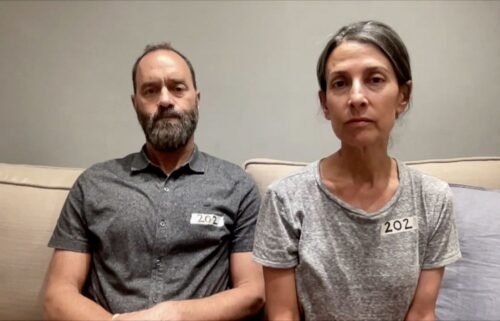What you need to know about coronavirus on Thursday, July 2

Six months into the pandemic, the situation is only getting worse.
The World Health Organization said yesterday that the number of new infections has exceeded 160,000 every single day in the past week — double the level seen at the height of the European outbreak in March and April.
In the Americas, the situation is spiralling out of control. Brazil surpassed yet another grim milestone yesterday, reaching 60,000 coronavirus deaths. The country reported 45,000 new cases in just 24 hours. Colombia has hit 100,000 infections, and there are now more deaths in Mexico than in hard-hit Spain.
The Middle East is also at a critical threshold, WHO says. The region saw more new cases in June alone than in January to May. Almost 90% of all deaths reported in the region are in Iran, Iraq, Saudi Arabia, Egypt and Pakistan.
And as the United States recorded 50,203 new infections yesterday, the highest ever, one expert told CNN that Texas, Arizona and Florida are close to entering “apocalyptic” territory.
At least five states — Arizona, California, North Carolina, Tennessee and Texas — reported a record number of new cases yesterday. Hospitals in the worst affected areas are struggling to cope.
At least 23 states have rolled back or paused reopening plans to some degree.
WHO says the fastest way out of this crisis is to follow the science. “We will never get tired of saying that the best way out of this pandemic is to take a comprehensive approach … Not testing alone. Not physical distancing alone. Not contact tracing alone. Not masks alone. Do it all,” the WHO chief said yesterday.
YOU ASKED. WE ANSWERED
Q: Is it safer to eat indoors or outdoors at a restaurant?
A: “Eating outside is less risky than eating inside, if everybody is six feet apart and the wait staff are all wearing masks. That keeps the risk as low as it can be,” said Dr. William Schaffner, an infectious disease expert at Vanderbilt University.
“Studies have shown that when you’re just talking, the larger [respiratory] droplets don’t really travel farther than three to six feet,” said Lindsey Marr, a professor at Virginia Tech who has been studying Covid-19 transmission.
Send your questions here. Are you a health care worker fighting Covid-19? Message us on WhatsApp about the challenges you’re facing: +1 347-322-0415.
WHAT’S IMPORTANT TODAY
Trump says he’s ‘all for masks,’ but believes virus will ‘disappear’
US President Donald Trump said yesterday that he would have “no problem” wearing a face mask in public in certain circumstances — a pivot from his months-long refusal to do so.
When asked whether he would wear a mask, Trump said he would. “I mean I’d have no problem. Actually I had a mask on. I sort of liked the way I looked. It was ok. It was a dark, black mask and I thought it looked okay. It looked like the Lone Ranger,” Trump told Fox Business.
During the same interview, Trump also said he still thinks the virus will “disappear” someday. As Trump continues to downplay the crisis, a divide has emerged inside his inner circle over whether he should turn his attention back to the pandemic or continue to focus on reopening the economy, sources told CNN.
Americans who stayed home before they were told to saved lives, study finds
If you were one of the Americans who decided to self-isolate before you were required to by state or local mandate, good for you. You saved lives. A study published in the journal “The Lancet: Infectious Diseases” found that individual decisions to stay put in homes likely helped slow the spread of Covid-19 before state or local stay-at-home orders were implemented by government officials.
The study found that social distancing measures and the slowdown of the virus were primarily driven by changes in individual behavior and local regulations — and that state and federal regulations were implemented either too late or not at all. In all 25 counties evaluated in the study, individuals moved around less six to 29 days before statewide stay-at-home orders were implemented.
Reopen bars now or schools this fall
If governors want schools to reopen in the fall, they have to contain outbreaks= in their communities now, and that begins with pausing or rolling back reopening plans, Dr. Ashish Jha, the director of the Harvard Global Health Institute, told CNN.
US school districts are trying to finalize what classes will look like in the fall, but some of the largest school districts still don’t have a plan.
There are a variety of models at play elsewhere, like staggered schedules and strict distancing. In Denmark, for instance, some schools have isolated each classroom into cohorts, or protective bubbles, and there is no mingling outside of a class. In the UK — one of the hardest hit countries — the government had to abandon a plan to reopen all schools.
US buys up almost all of the world’s supply of key Covid-19 drug
WHO said yesterday it was working to verify reports that the US is hoarding remdesivir, the only drug that has an emergency use authorization from the US Food and Drug Administration to treat coronavirus, and it is patented by Gilead Sciences.
The Department of Health and Human Services said on Monday it has secured 100% of Gilead’s projected production for July, and 90% of its production for August and September — plus more for clinical trials. Gilead had donated a supply of 1.5 million doses of remdesivir to countries across the world, which it says is enough for around 140,000 treatment courses. Almost a million doses were reserved for the US, according to the HHS, but the supply is now running out.
Another drug, the widely available steroid dexamethasone, is useful for providing supportive care to the sickest Covid-19 patients who require ventilation or oxygen, according to preliminary research from the UK.
The pandemic is threatening Xi’s legacy
Ending poverty in 2020 was going to be the crowning achievement of China’s President Xi Jinping. But the pandemic put that goal at peril. China shut down factories in January and February, severely damaging employment and production domestically.
China’s economy shrank by 6.8% in the first quarter of 2020 compared to a year earlier and for the first time in decades, Beijing didn’t set a GDP target. China has been trying to dig itself out of its economic slump, and there are some signs of recovery — though the path forward is still looking slow and painful.
ON OUR RADAR
- New Zealand’s health minister became the latest official to resign after breaching lockdown rules.
- The Covid-19 vaccine candidate being developed by US pharmaceutical company Pfizer and German biotechnology company BioNTech has yielded positive data in early tests, the companies said.
- More than a dozen members of Brazil’s Xavante people have recently died of coronavirus symptoms, adding fuel to fears that the virus would hit the country’s indigenous populations hard.
- Almost a third of Asian Americans say they’ve been subject to racist slurs or jokes since the pandemic began.
- A 5-year-old boy with prosthetic legs has raised $1 million for the UK health service by walking six miles.
- Prague celebrated the end of lockdown with a mass dinner party at a 1,600-foot table.
- A healthy 30-year-old man “didn’t really care about Covid” and went to a crowded bar. He ended up in a hospital on a breathing tube.
- The number of active-duty US military personnel infected with the novel coronavirus has more than doubled in the past three weeks.
- Yale University will open campus without sophomores in fall and without freshmen in spring.
- Jennifer Aniston and Tom Hanks really want everyone to “wear a damn mask.”
TOP TIPS
Sometimes finding resilience means reinventing old rituals for a new time. It could be carving out an hour a day to do something fun. Keep a limit on how much news you’re watching. Focus on things that you can control. And use now as a time to remember who you really are. Here’s a handy guide on how to become more resilient in these uncertain times.
TODAY’S PODCAST
“We have nurses and doctors in our ICU, [who are] caring for these Covid patients, that have to wear the same N95 respirator five days in a row because we don’t have any other ones. We’re that short.”
— Michael Osterholm, infectious disease expert at the University of Minnesota
We’re really just at the beginning of this pandemic. Until there’s a vaccine, we could be living with this virus for a long time. How did we lose control? And where do we go from here? CNN’s Chief Medical Correspondent Dr. Sanjay Gupta speaks to Michael Osterholm, director of the Center for Infectious Disease Research and Policy at the University of Minnesota. Listen Now.




